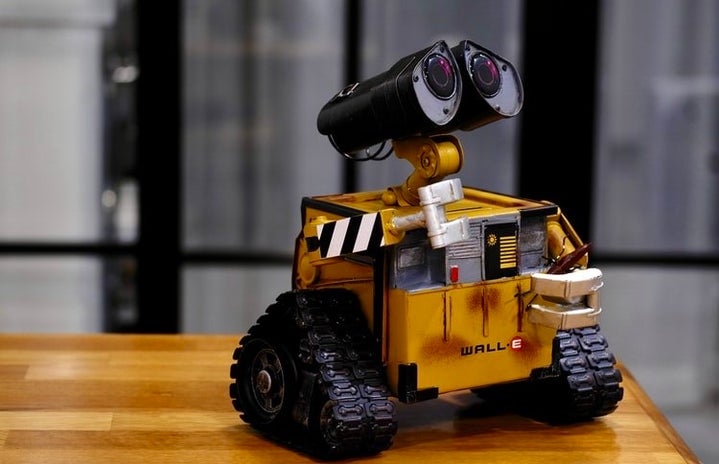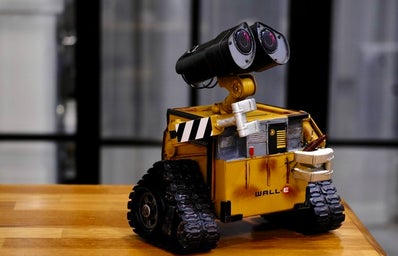The 21st century has seen astronomical leaps in technology, especially in the past fifteen years. This rate of technological progress is not slowing down and as curious humans who wish to improve society, we may never stop, even if this comes to the detriment of those around us. Most people have an understanding of Supply and Demand in relation to the purchasing and selling of goods, but have you ever thought about how this same economic principle applies to your job? As technological progress improves, companies can hire less people to perform the same job more efficiently. However, we are not just talking about employees taking advantage of technology here, we are also facing the reality that the technology itself can and will replace many of our jobs entirely. In fact, this is already happening. Self driving cars are already being developed and put on the road, to the detriment of one of the most common jobs in the United States: truck driving. This is nothing new for manufacturing workers, whose loss of over 5 million jobs since 2000 significantly contributed to Donald Trump’s election in 2016. More than 80% of this job loss can be attributed to automation (Yang, n.d.)
To say that we, as a nation, are unprepared for this sweeping technological overtaking of what makes up half of our economy’s jobs is an understatement. The most popular job in the U.S is to be a retail cashier and we are already seeing how robots are replacing workers in the service and retail industry, which require low skill and repetitive movements. These are tasks that humans take a lot longer to perform and with more error than a robot. It is not uncommon to see people ordering from computer kiosks at their local McDonalds, rather than placing an order with a human. As the technology improves, this will only get worse, until humans simply become obsolete in this field. It is much more profitable for companies to invest in the use of robots, who do not need to be paid a salary or benefits to perform to a high standard. The most common job in 29 states is truck driving and with the creation of self-driving cars, 3% of the American workforce, or 3.5 million jobs are estimated to be lost.
Perhaps the most indicative example of this shift towards automation in the driving and food service industries is Pizza Hut’s announcement that the company will develop and use driverless delivery vehicles (Paquette, 2018). This would mean the end of a much needed entry level middle class job for millions of Americans. Automating vehicles has a domino effect on many other industries, which are dependent on truck drivers, such as hotels along highways, truck stops, restaurants, and even security guards. These jobs rely on truck drivers stopping at their restaurant or hotel for business. Security guard workers are being replaced by self driving surveillance vehicles, robot bartenders are a luring attraction in Las Vegas and other repetitive jobs like being a barista can easily be automated. Rideshare companies such as Uber and Lyft will drastically change. Uber projected that about half of their rides will be fully autonomous by the year 2022 and whether or not that projection is sooner or later than stated, you can be sure that it is coming. Even just a fraction of truck drivers being displaced would have a rippling effect in the economy, with 5.2 million workers serving the needs of truckers at hotels, truck stops, and restaurants (Yang, n.d.).
While the loss of blue collar jobs has been a clear trend, which is easy to imagine being the first victims in the wake of automation, white collar jobs are not immune. Doctors, lawyers, and bankers are also at risk and we can already see this on a smaller scale today. We replace tax advisors with online services like TurboTax or H&R Block, for example. Radiologists are being replaced through technology that can read scans at a rate 10,000 times faster than human radiologists and can classify tumors 50% better (Mueller & Massaron). Surgical robots were used to perform a surgery on a grape, which demonstrated the high precision of the da Vinci Xi (Nagesh, 2018). A study performed by the Brookings Institute took a closer look at jobs that are exposed to AI. In the study, they analyzed the overlap between more than 16,000 AI-related patents and more than 800 job descriptions, which suggested that highly educated, well paid workers may be heavily impacted by AI. Because of AI’s ability to perform tasks that require planning, learning, reasoning, problem-solving and predicting, which largely make up white collar jobs, workers who hold a Bachelor’s degree would be exposed to AI five times more than those with just a high school degree (Liu, 2019). Doctoral candidate from Stanford University Michael Webb states “AI is good at tasks and optimization, which tend to be done by high-skilled workers. So if you’re optimizing ads as an online marketer or a radiologist interpreting medical scans, all of these things take a long time for humans to be good at them. But when it comes to algorithms, once you have the right training data, they tend to be better than humans” (Liu, 2019)
If automation displaces human workers, rendering them jobless and potentially unable to support themselves, then why are we even doing this? Well, because automation saves us a lot of money as well as human lives. There are a lot of positive benefits that can be attributed to automation, we just have to figure out how to structure our workforce around it. Switching to automated vehicles, for example, will save billions of dollars and can save thousands of lives. Every year, crashes involving big trucks kill 3,903 people in the US and 90% of the time, the accident is attributed to driver error, such as fatigue (Yang, n.d.) Globally, there are 1.25 million traffic deaths every year and 34,000 in the U.S alone. These are deaths that can be completely avoided thanks to self driving cars. People could live in a world where sleeping, getting work done, or reading in the car is possible without having to worry about keeping your eyes on the road. It would be a more accessible world for those with disabilities, who are ineligible for a drivers license and find it difficult to arrange for rides. Likewise, a highly intelligent, precise machine could do wonders in the medical field, saving lots of time, money, and lives. Automation can replace menial, repetitive tasks that people do not want to do and find unfulfilling.
Automation will change the occupational landscape in such a way that we will have to rethink what jobs themselves look like and the place that work has in society. According to McKinsey and Company, about half the labor people are paid to do could theoretically be automated using current demonstrated technologies. They estimate that between 400 and 800 million individuals could be displaced by automation and need to find new jobs by 2030, around the world. Globally, up to 375 million workers may need to switch occupational categories (Manyika et al., 2017). However, what about the people who will get left behind? The bulk of the jobs that will get automated first are low skill jobs, occupied by people with no higher education or other formal training and perhaps lacking the opportunity to do so. While your instinctual response may be “just retrain the workers to do something else, just like we always have through innovation.” The average truck driver is a 49 year old male with a high school education, earning around $50,000 a year. The reality is that a large percentage of these workers are unable to or uninterested in receiving the education that would be necessary to embark on some new skill like software engineering. Studies have also shown that government retraining programs are very ineffective.
What is the solution? One proposed by 2020 Democratic presidential candidate Andrew Yang is to implement a universal basic income (UBI). Essentially, give every citizen a guaranteed income of $1200 a month with no strings attached. Everyone is eligible and they can choose to opt in or opt out, depending on their assessment of other benefits they are eligible for. Other conceptions of UBI consist of eliminating all other welfare programs altogether. This is not a new idea, by any means. Thomas Paine and Martin Luther King Jr. supported it, as well as libertarian economist Milton Friedman, who proposed a minimum guaranteed income via a negative income tax Even Richard Nixon actively tried to pass Friedman’s conception of UBI (Gordon, 2014). If this sounds radical, just tell that to Alaska, a red state that has implemented UBI for the past forty years with oil money. Since 1982, Alaska has given every man, woman, and child a check. It’s a chunk of the state’s Permanent Fund Dividend, where Alaska deposits 25% of mineral royalties generated from its mines, oil, and gas reserves. This money is invested by the Alaska Permanent Fund Corporation in domestic and global stocks and then distributed to Alaskans every September (Sundlee, 2019). Massively popular in a conservative state, UBI is not a left or right wing policy proposal. It is merely an inevitability.
In the future, humans will become obsolete and there will not be enough jobs to go around. What Andrew Yang argues is that technology is the oil of the 21st century, so why not invest in technology and give every American a slice of every Amazon search, Facebook ad, and robot truck mile through the implementation of a Value Added Tax (VAT)? The U.S is the only advanced economy without a VAT tax; this tax would be effective in ensuring that large profitable companies like Amazon cannot find loopholes to dodge taxes. This is just Andrew Yang’s specific vision of how to implement UBI and is not representative of all variations of the program. If every person were to receive $1200 a month in UBI, people would spend it and it would circulate throughout the economy. We would receive hundreds of billions of dollars in new revenue and save money on incarceration, homelessness services, and emergency room health care. This could lead to a physically and mentally healthier, better educated, and more productive society. Prominent tech figures with an understanding of AI have thrown their support behind UBI, such as Elon Musk, Mark Zuckerberg, and Bill Gates. Elon Musk has said “I think we’ll end up doing a universal basic income. It’s going to be necessary” (Weller, 2017)
Further down the line, society may transform so that life is more about raising children and enjoying life, while robots perform jobs for us and we are supported through UBI. It may sound nice to think about a future where humans do not necessarily have to work, but work has historically been a part of the human experience. A future in which humans’ lives that are more focused on raising children, recreation, maintaining their health, and tending to their hobbies is all well and good but could also lead to a loss of identity. There are also concerns that money could become further concentrated into the hands of the few who own the robots, especially because tech companies employ relatively few people than the corporations of the past. These changes are coming and policy makers are ignoring the problem. Such sudden changes like the Coronavirus pandemic have shown just how unpredictable the world around us can be and the devastating effects it can have on the economy. We are also already seeing checks being written out to Americans due to the lockdown which has rendered people jobless, now it is time to take the threats of automation seriously.
References
Gordon, N. J. (2014, August 6). The Conservative Case for a Guaranteed Basic Income. The Atlantic. https://www.theatlantic.com/politics/archive/2014/08/why-arent-reformico…
Liu, J. (2019, November 27). High-paid, well-educated white collar workers will be heavily affected by AI, says new report. CNBC. https://www.cnbc.com/2019/11/27/high-paid-well-educated-white-collar-job…
Manyika, J., Chui, M., Bughin, J., Woetzel, J., Batra, P., Ko, R., & Sanghvi, S. (2017, November 28). Jobs lost, jobs gained: What the future of work will mean for jobs, skills, and wages. McKinsey & Company. https://www.mckinsey.com/featured-insights/future-of-work/jobs-lost-jobs…
Mueller, J. P., & Massaron, L. (n.d.) New surgical techniques and artificial intelligence. Dummies. https://www.dummies.com/software/other-software/new-surgical-techniques-…
Nagesh, A. (2018, November 27). New meme alert: Did you know they did surgery on a grape? BBC News UK. https://www.bbc.co.uk/bbcthree/article/4a466b39-8b03-4717-bde8-822760b43…‘da%20Vinci%20Xi’.
Paquette, D. (2018, January 12). Pizza Hut boldly says driverless delivery will actually create more jobs. The Washington Post. https://www.washingtonpost.com/news/wonk/wp/2018/01/11/pizza-hut-boldly-…
Sundlee, R. (2019, September 5). Alaska’s universal basic income problem. Vox. https://www.vox.com/future-perfect/2019/9/5/20849020/alaska-permanent-fu…
Weller, C. (2017) February 14). Elon Musk doubles down on universal basic income: ‘It’s going to be necessary’. Business Insider. https://www.businessinsider.com.au/elon-musk-universal-basic-income-2017…
Yang, A. (n.d.) Self-driving vehicles: What will happen to truck drivers? Evonomics. https://evonomics.com/what-will-happen-to-truck-drivers-ask-factory-work…



